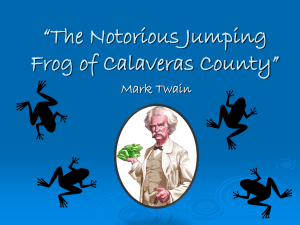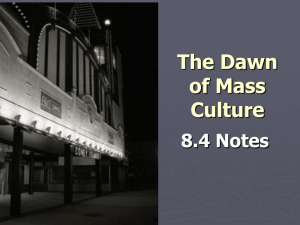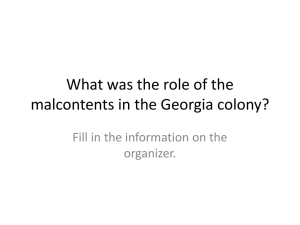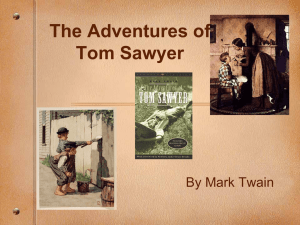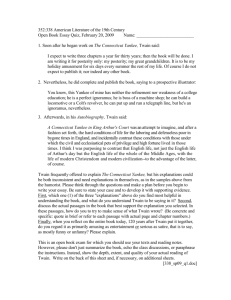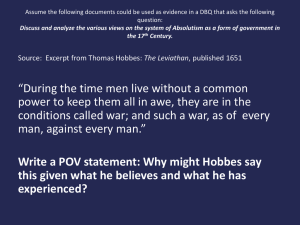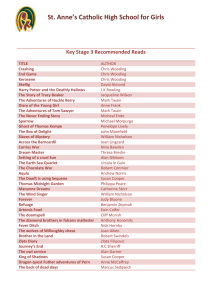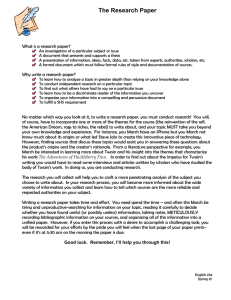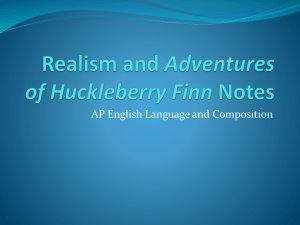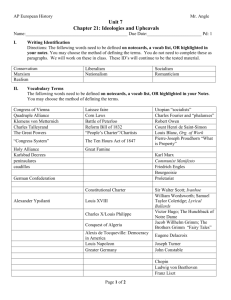Americká literatura
advertisement
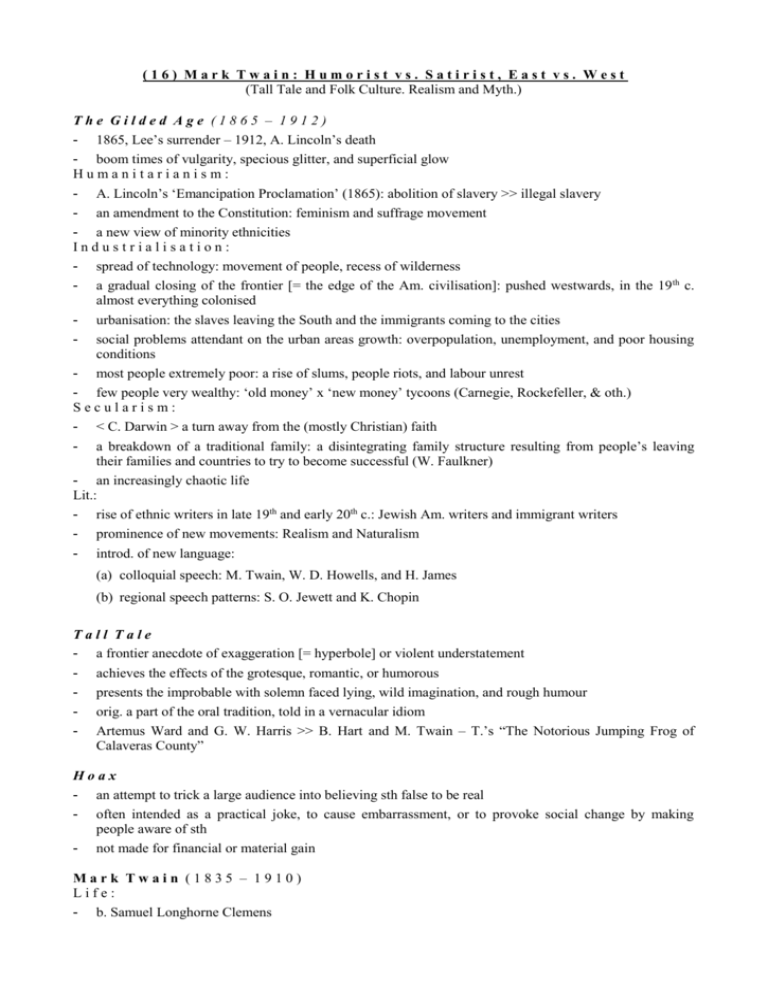
(16) Mark Twain: Humorist vs. Satirist, East vs. West (Tall Tale and Folk Culture. Realism and Myth.) The Gilded Age (1865 – 1912) - 1865, Lee’s surrender – 1912, A. Lincoln’s death - boom times of vulgarity, specious glitter, and superficial glow Humanitarianism: - A. Lincoln’s ‘Emancipation Proclamation’ (1865): abolition of slavery >> illegal slavery - an amendment to the Constitution: feminism and suffrage movement - a new view of minority ethnicities Industrialisation: - spread of technology: movement of people, recess of wilderness - a gradual closing of the frontier [= the edge of the Am. civilisation]: pushed westwards, in the 19 th c. almost everything colonised - urbanisation: the slaves leaving the South and the immigrants coming to the cities - social problems attendant on the urban areas growth: overpopulation, unemployment, and poor housing conditions - most people extremely poor: a rise of slums, people riots, and labour unrest - few people very wealthy: ‘old money’ x ‘new money’ tycoons (Carnegie, Rockefeller, & oth.) Secularism: - < C. Darwin > a turn away from the (mostly Christian) faith - a breakdown of a traditional family: a disintegrating family structure resulting from people’s leaving their families and countries to try to become successful (W. Faulkner) - an increasingly chaotic life Lit.: - rise of ethnic writers in late 19th and early 20th c.: Jewish Am. writers and immigrant writers - prominence of new movements: Realism and Naturalism - introd. of new language: (a) colloquial speech: M. Twain, W. D. Howells, and H. James (b) regional speech patterns: S. O. Jewett and K. Chopin Tall Tale - a frontier anecdote of exaggeration [= hyperbole] or violent understatement - achieves the effects of the grotesque, romantic, or humorous - presents the improbable with solemn faced lying, wild imagination, and rough humour - orig. a part of the oral tradition, told in a vernacular idiom - Artemus Ward and G. W. Harris >> B. Hart and M. Twain – T.’s “The Notorious Jumping Frog of Calaveras County” Hoax - an attempt to trick a large audience into believing sth false to be real - often intended as a practical joke, to cause embarrassment, or to provoke social change by making people aware of sth - not made for financial or material gain Mark Twain (1835 – 1910) Life: - b. Samuel Longhorne Clemens - grew up in Hannibal, a frontier town by Mississippi = the cross-section of all the directions and the infl. of the Western wilderness x Eastern civilisation, Southern slavery x Northern abolitionism - apprenticed in a printing shop, worked from 12 to support family after his father’s death - largely self-educated - intended to go to Amazon to find adventure and wealth x but: instead apprenticed to a pilot of a MS riverboat > adopted the penname of Mark Twain = ‘safe water’ - himself a middle class, married a genteel and gentle woman of upper class, and had servants to run the house - befriended with the master storyteller B. Harte, the lecturer A. Ward, and the critic W. D. Howells Work: - a humorist, realist, social realist, and the repres. man of Am. pop. culture: more successful than any of the authors before him - began writing humorous accounts of his riverboat pilot activities for the Keokuk Saturday Post [= Iowa Sat. Post], establ. the pattern of peripatetic journalism - after the success of his The Jumping Frog of Calaveras County refined his narrative technique: a written equivalent of ‘deadpan’ lecturing = convincing the audience he simply reports what oth. said and did - remained the rough Westerner with no uni education (unlike former authors) establ. a new pattern of writing incl. the frontier humour and the storytelling conventions of his journalistic experiences - < journalism > his critical sense of violence, corruption, and the decay of the Am. dream - < local colour realism: local aspects, aspects of sentimentalism, and nostalgia > his nostalgia for the Age of Innocence (= the pre-Gold Rush x the Gilded Age) and criticism of the damaging infl. of commercialism and industrialism - < folklore, the oral tradition of Tall-Tale > his interest in local customs - experimented with various genres - W. D. Howells’s memoir My Mark Twain: T. = ‘the Lincoln of our literature’, both raised from provincialism to the world-wide acknowledgement, and spoke to and for the common man “The Notorious Jumping Frog of Calaveras County” (1865): - the 1st piece to bring him pop. - a Tall Tale: the reader does now know whether it is true, made up, or modified - an ed. coming to the county from the East slightly objects the local character’s crazy tales and his overtaking the conversation The Innocents Abroad (1869): - a travel book - the narrator = an average Am., a certain protagonist x but: mainly local characters described - orig. a series of letters for newsp from his excursion to Eur. and the Holy Land - a satire against the pretentious, decadent, and undemocratic Old World (the East x the West) The Gilded Age (1873) - in collab. with Charles Dudley Warner Roughing It (1877): - the same pattern as in his Innocents x but: applied to the Wild West - an account of his and his brother’s adventures in the NV territory and the schemes he devised to get rich quick The Adventures of Tom Sawyer (1876): - a myth of the endless summer of childhood pleasures mixed with terror - pop. x but: primarily important as a place of orig. of his Huck Old Times on the Mississippi (1875) >> Life on the Mississippi (1883): - orig. instalments for the Atlantic Monthly ed. by W. D. Howells >> enlarged into a book - a chronologically backward and psychically inward return to the Hannibal of his boyhood The Adventures of Huckleberry Finn (1884): - his realistic, satiric, yet lyrical masterpiece - whole in a very natural spoken vernacular language - a sequel to Tom x but: more serious - a change of the POV to the 3rd person narrator - an attempt of a more complex explanation: deconstructs some myths x but: reconstructs oth. T h e ‘ G r e a t D a r k ’ P e r i o d (mid 1880s – mid 90s): - a decline of his lit. achievement - a lecture tour through the world to cover his bankrupt - a decade of his daughter’s death, his wife’s decline into invalidism, and his own deteriorating health A Connecticut Yankee in King Arthur’s Court (1889): - his anarchic impulses end up in a massacre and rejection of old and new values alike The Tragedy of Pudd’nhead Wilson (1894): - disastrous effects of slavery on the victimiser and victim alike - his satire turns to scorn and contempt for the ‘damned human race’ Following the Equator (1897): - an account of his lecture tour - written in En. where he settled, and where learnt about his daughter’s death Which Was the Dream? (1967): - a coll. of unfinished and perhaps unfinishable symbolic stories of his ‘Great Dark’ period - a sense of madness, guilt, and responsibility for his daughter’s death T h e ‘ R e s t o r a t i o n ’ P e r i o d (mid 1890s +): What Is Man? (1899): - his ‘Bible’ - man = a machine driven by self-interest and craving for approval - his indignation directed at orthodox Christianity, racism, imperialism, etc. The Mysterious Stranger (1916): - a bleak, despairing, and sarcastic exploration of contemp. city people Ad The Adventures of Huckleberry Finn: “Notice”: - intention: more serious than in Tom - exposition: a traditional summary of the plot, some implication of the themes, and some hints on the motifs (a) Culture: - an escape from the civilised world: ‘sivilised’ misspelled self-consciously = a sense of sth different both in Huck’s spelling and understanding of civilisation - the uncivilised South culture: allows the institutions to keep the slavery - H.’s revolt against this concept of culture, and desire to escape the pattern x but: not against the civilisation entirely (the values of home, company of oth. boys, etc.) - conl.: H’s trip to the West - x but: H. = a conformist because always adapting to will – when kidnapped by his father adapts again to this life, etc. (b) Conscience, Lie, and Truth: - an implication of nobody being always a truth-teller, perhaps with the exception of Polly and maybe Mary: H. a great liar = a bad boy - x but: truth x lie in a broader context a lie can save life in certain situations - the concept of conscience as formed by the society: H. wicked from the society’s POV – hiding Jim = stealing property, etc. - x but: from his POV the ‘sound heart’ matters – H.’s decision to go to hell rather than to accept the false value system of the society - T.: H.’s ‘sound heart’ triumphs over his deformed conscience x but: only the author and the reader can see that ‘conscience...can be trained to approve any wild thing you want it to approve if you begin its education early and stick to it.’ (c) Black Man: - an interracial friendship: H. and Jim split in the storm J. F. Cooper’s The Last of the Mohicans - a challenge of the stereotype of a black man: J. uneducated, easy to be fooled, yet harmless, and goodnatured - x but: J. = a round character, and an educational element – H.’s apology for playing a practical joke with the snake on the island on J., the 1st lesson he gets, though not understands - the appearance of J. = a new motivation for H. (d) Social Satire: - the 2nd part of the novel, after the separation of H. and J. The Am. South Upper Class: - the Grangerford family - a complex way portrayal: (a) one POV: the police, very nice, and much admired ‘cavalier class’ repres. the Am. South in pop. imagination (b) another POV: the long-time argument with the neighbours far from the medieval ‘Chivalric code’ – nobody knows the reason for the fight anymore, no rules in the fight (attacks from ambush, frontierkind of war, and even the boys not preserved) - hypocrisy – the appreciation of the sermon on the way from the church x but: the guns ready to kill immediately - the discrepancy in their belief in God x their inability to recognise a black man as a human being actually leading to the Civil War - conservatism: (in the literal sense of the word – the poet’s room in the family kept as a museum) preservation of certain values no matter what they are, incl. the low standards of taste, and inability to recognise real quality - the deconstruction of the basic myth of the Am. life The Am. South Middle Class: - the Phelps family - stupidity, related more to the Southern middle class – easily tricked by the Duke and Dauphin - restraint, lack of respect to the life on an Af.-Am. – the farmers nice people with hardly anything to object x but: the good woman a real Southerner in her statement that a loss of life of an Af.-Am. means no problem The ‘Glorious’ Am. South: - a challenge to the image of the glorious South – the small shabby, dirty, and decaying town along the MS (e) Motif of the MS: - both the narrative and the language flow like the river of MS (f) also conc. with: maturation, learning, discovering Am., etc.
